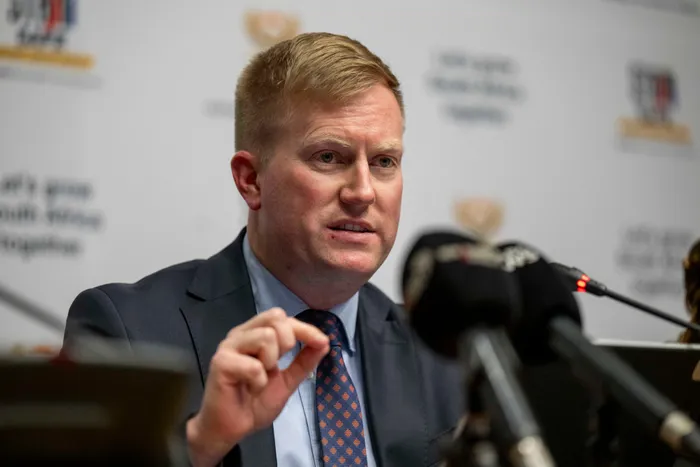
Public Works and Infrastructure Minister Dean Macpherson says there are 318 properties that are currently protected by private security companies.
Image: Henk Kruger / Independent Newspapers
Taxpayers have paid R779 million over the past five years to provide private security at state-owned properties across the country.
This was disclosed by Public Works and Infrastructure Minister Dean Macpherson when he was responding to parliamentary questions posed by DA MP Edwin Bath.
Macpherson said the expenditure on private security contracts was R140.9m in 2020/21, R124.6m the following year, R144.8m in 2022/23, R161.7m two years ago, and R199.9 in 2024/25.
He also said the department has a total of 318 properties that are currently protected by private security companies.
“This is a constantly changing number due to properties that get vacated by tenants and thus require security services to prevent and respond to threats of illegal occupation. This number includes occupied and unoccupied properties located in various regions.”
Macpherson further said there was a total of 248 security contracts in place.
The top 10 costly private security contracts signed by the department are worth R81m and cover periods ranging from 24 to 36 months.
He said none of the listed contracts exceeded the original contract value.
“The department works hard to ensure that security contracts remain within the awarded value.”
Macpherson also said the anticipated implications on the continued protection of state-owned properties currently secured through private security contracts remain uncertain, as the proposed regulations by the Private Security Industry Regulatory Authority are yet to be finalised.
“Once these regulations are finalised, the department will align its procurement documentation for private security contracts to ensure compliance with the amended regulatory framework,” he said.
Macpherson said the department has a total of 10,458 unutilised state-owned properties.
“This does not mean that each one can house a government organisation. They could be derelict, condemned, or unfit for human habitation.”
He was responding to ATM leader Vuyo Zungula, who asked the reason for the justification for the government's use of private properties.
Macpherson said the default position was to provide state-owned accommodation, but his department found itself relying more on private-leased accommodation because state-owned assets were not conducive to occupation.
The department has spent R5.5 billion on private leases and R2.8 billion on maintenance during the 2024/25 financial year.
He said the department has adopted asset optimisation strategies that sought to prioritise the development, refurbishment, and repurposing of state-owned properties to reduce the size of private leased properties.
“The minister has tightened controls on how and when leases are required as well as taking action against officials who collude to award leases that are needed,” said Macpherson, adding that he has referred the top 10 leases by value to the Special Investigating Unit for investigation to understand whether they were awarded correctly and if there was value for money.
Asked by EF MP Blose Mazwikayise about unoccupied state properties, Macpherson said there were currently 1,743 that remained unoccupied and considered by his department as being under-utilised.
“Properties have been identified by the Department of Public Works and Infrastructure (DPWI) and submitted to the Department of Higher Education and Training (DHET) for analysis, including evaluation to determine suitability for student accommodation as per geographical needs and budget availability.
“This information is being awaited from DHET. On receipt of the above, DPWI will determine the most appropriate implementation model aligned to its asset optimisation strategy to support student accommodation requirements,” he said.
mayibongwe.maqhina@inl.co.za